Types of urinary incontinence

Urinary incontinence is the loss of control over one’s bladder. While many people may experience occasional leaks, it might be a little more severe for other people. This can’t be classified as a disease, but instead, it’s a symptom that’s present in many conditions.
Typically, aging plays a big part in this symptom occurring in people; however, the causes may be different for men and women. Urinary incontinence is not just one type but can be different for other people.
The types of urinary incontinence include:
Urge incontinence:
This type of urinary incontinence happens when you have an intense urge to urinate that comes randomly, followed by the involuntary leaking of urine. It’s also called the OAB or Overactive bladder. These urges follow you through the night and are caused by issues like:
- An infection
- Neurological disorder
- Diabetes
- Aging
- Damage to bladder nerves
- Damaged nervous system
- Muscle damage
Functional incontinence:
Any physical or mental disability that doesn’t allow you to reach the toilet in time to urinate may result in functional incontinence. Examples of this type include having a walker which slows you down; having arthritis where you may not be able to open the button of your pants easily; or intellectual disability/dementia, which keeps you from realizing that you need to urinate or from locating a bathroom.
Mixed incontinence:
This type of incontinence is easy to understand by its name. This occurs when you’re experiencing more than one type of urinary incontinence – usually, it’s a mix of stress and urges for incontinence. This type includes leaking as well as a strong and sudden urge to urinate
Reflex incontinence:
Reflex incontinence happens when the muscles around your bladder start to contract without warning, resulting in leaking urine. This usually happens due to neurological impairment in the person.
Stress incontinence:
Stress incontinence occurs when the muscles and other tissues that support the urethra (pelvic floor muscles) and the muscles that control the release of urine (urinary sphincter) weaken. It also happens when there’s pressure applied during any physical movement or activity. Activities like sneezing, coughing, laughing, or heavy lifting can pressure your bladder and cause urine leakage.
This usually also takes place in pregnant women and women who’ve just gone through childbirth. This is because your body goes through a lot of changes during pregnancy. Your bladder is repeatedly squished by the baby which results in the weakening of pelvic floor muscles. Because of this, your bladder is unable to hold urine in for a long period of time and there might be an extreme urgency every time you do an activity or feel an urge to urinate.
Overflow incontinence:
Overflow incontinence refers to the act of losing urine involuntarily due to an impairment in your bladder. This means the person has weak bladder muscles that don’t allow their bladder to empty or make them have a full bladder without feeling any urges to urinate. The main symptom is a sudden and strong urge to urinate which results in a leak. This happens because:
- Nerve damage
- Weakening of bladder muscles
- Constipation
- Specific medication
- Medical conditions block the flow of urine.


